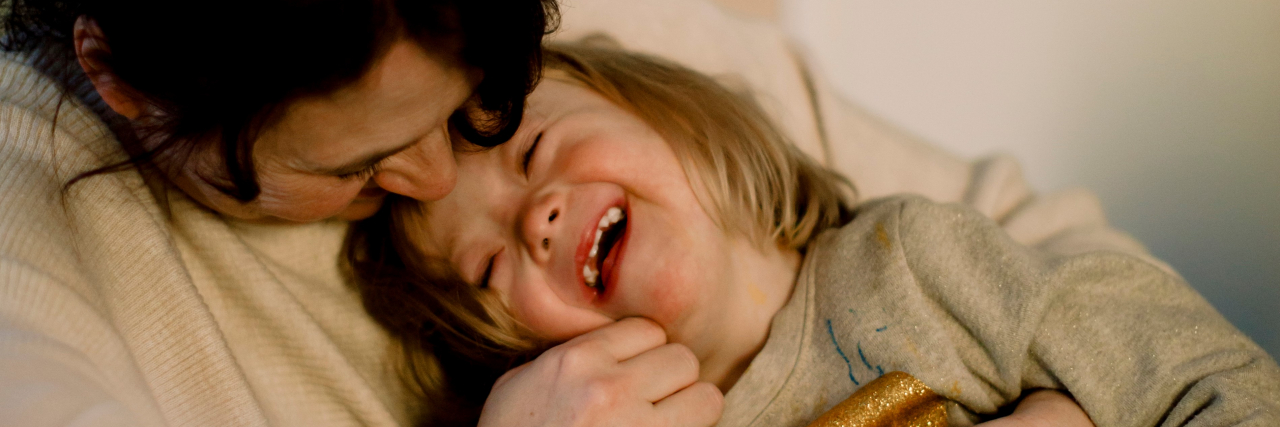What It's Really Like to Be a Single Mom With a Child With Down Syndrome
Editor's Note
If you have experienced emotional abuse, the following post could be potentially triggering. You can contact the Crisis Text Line by texting “START” to 741741.
I was 46 when I found out I was pregnant. I was pregnant when my oldest child had just given birth to her first kiddo. I was a grandma and still had 11- and 13-year-old boys at home. I was teaching at a state school in a behavioral disability classroom. I thought I was nearing the end of my teaching career.
My husband tried to talk me into an abortion. I couldn’t see why. We had raised his daughter and were still raising our two biological boys — we could add another child to the mix. We were employed and housed, and we could be parents again.
I asked not to have an amniocentesis since I was almost three months along before realizing I was pregnant. When our daughter was born, I knew she had Down syndrome. The hospital said she was “fine” and sent us home after one day. They would only share that she had jaundice. I knew this wasn’t right, though. Her fingers and hands were blue, and her eyes were clear. I took her to the pediatrician, who immediately put a pulse oximeter on her and found out that she was deprived of oxygen. I spent the eight days that my daughter was in the NICU at Children’s Hospital praying. Once doctors found three holes in my daughter’s heart and gave her an official Down syndrome diagnosis, we were released home.
Fast-forward three years. I found myself driving in the middle of the night, windows down, -6 degrees outside. My 3-year-old girl was in the back seat. We had no clothes, no diapers, and no place to sleep. My husband of 24 years had asked for a divorce, and when I refused, he had insisted. I found out later that he had planned for months to divorce me behind my back. I was a single mom — and still am six years later.
We survived the below-freezing weather that night with the help of my family 3000 miles away. I lived through the divorce, but my two sons chose to live with their dad instead of with me. I lost my career of 14 years because we lived in my husband’s county since his discharge from the Marines. I had survived moving across the country, getting another job, and living with my parents for a year at age 50. I lived through moving back across the country, knowing I would be alone without any support because my boys’ father was abusing them, and I thought I could help. I got another teaching job and bought a house on my own with no one’s help.
I was five years past my 24-year marriage when COVID-19 hit. I was told I had a week to put all of my coursework online and begin teaching my students. My daughter’s school told me that I would need to teach her from home. I did all of this, and I didn’t ask or get help from anyone. Her father had fought hard not to have any custody or pay any child support, so I was on my own. I had chosen a home in one of the areas with the best schools in Missouri.
I soon learned that this was not the case for students with disabilities. COVID-19 was a nightmare. They shut down the school for three weeks but came back after summer break as if nothing had happened. Masks were optional. As a mother of an immunocompromised child, I was panicked. Thinking about what would happen to my daughter if I were to get sick terrified me. I went into overdrive.
My “fight or flight” response kicked in. I washed everything daily, and I kept bottles of bleach all over my house. If my daughter got sick, I would have to stay home with her, and if I got COVID-19, we might die in the house, and no one would know. The neighbors would not be of help since they didn’t think it was a big deal.
People began dying — students, aunts, uncles, and cousins. It was a nightmare, but I felt I had been living one for years already. Then, two years into the pandemic, my stepdaughter was murdered by her live-in boyfriend of 14 years. I broke down. I called a psychiatrist for help. I realized that my friends and family had had enough of my life. I certainly had too. It was the best thing I’ve ever done. Talking to someone without skin in the game is freeing. You can say anything, and they won’t defend or scold you. My psychiatrist didn’t solve my problems, but she helped me sort through them in a calm fashion.
I’m still dealing with my child’s lack of inclusion in a state where things could be a heck of a lot better — but I have someone in my corner now. I know I’m doing the best I can for my little girl and the thing is, she doesn’t care about the struggles. She loves and laughs every day. When she’s old enough to understand, I’ll tell her everything.
Parenting is a role that never ends, and we often have to just keep on rolling with it. I just try to roll forward. To all my fellow single moms with children with Down syndrome, keep rolling on. You’ve got this!
Getty image by Maskot.

